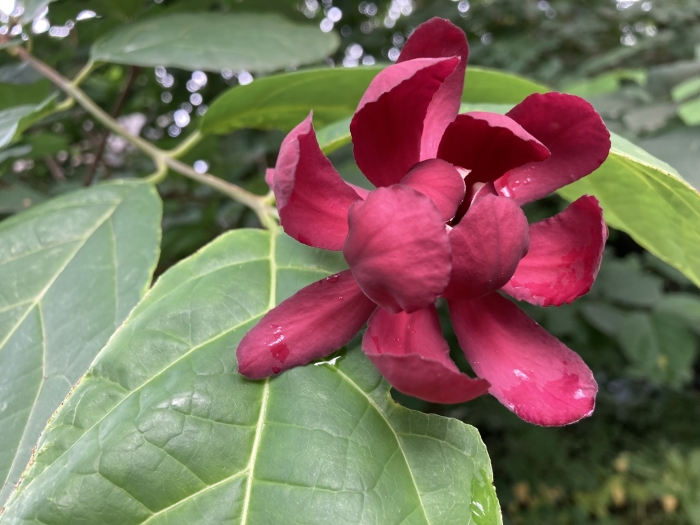Eastern Sweetshrub
(Calycanthus floridus)
Eastern Sweetshrub (Calycanthus floridus)
/
/

By Heather DeGaetano no rights reserved
Public Domain
Image By:
By Heather DeGaetano no rights reserved
Recorded By:
Copyright:
Public Domain
Copyright Notice:
Photo by: By Heather DeGaetano no rights reserved | License Type: Public Domain | License URL: http://creativecommons.org/publicdomain/zero/1.0/ | Uploader: hdegaetano | Publisher: iNaturalist |










































































Estimated Native Range
Summary
Calycanthus floridus, commonly known as Eastern Sweetshrub, Carolina Allspice, or Spice Bush, is a deciduous shrub native to the understory of forests and along stream banks in the eastern United States. It typically grows to a height of 6 to 9 feet (2 to 3 meters) with a similar spread. The shrub is notable for its dark red to brownish-purple flowers, which bloom in late spring to early summer and emit a fruity, spicy fragrance. The flowers are somewhat showy, attracting attention with their unusual, magnolia-like appearance. The plant’s leaves are dark green with a paler underside, ovate or elliptical, and grow to about 6 inches in length. The bark has been historically used as a cinnamon substitute, and the petals are used in tea-making, though caution is advised due to the presence of potentially harmful alkaloids.
Eastern Sweetshrub is valued for its fragrant flowers and is used in horticulture for border planting, as a specimen plant, or in naturalized areas. It is adaptable to a range of soil types, provided they are well-drained, and it thrives in full sun to part shade. While generally disease-resistant, it is susceptible to crown gall caused by Agrobacterium tumefaciens. The plant is recognized for its ecological role as a pollinator plant, especially for beetles. It is not considered invasive and is relatively low-maintenance, making it a suitable choice for gardeners seeking a unique and aromatic addition to their landscapes.CC BY-SA 4.0
Eastern Sweetshrub is valued for its fragrant flowers and is used in horticulture for border planting, as a specimen plant, or in naturalized areas. It is adaptable to a range of soil types, provided they are well-drained, and it thrives in full sun to part shade. While generally disease-resistant, it is susceptible to crown gall caused by Agrobacterium tumefaciens. The plant is recognized for its ecological role as a pollinator plant, especially for beetles. It is not considered invasive and is relatively low-maintenance, making it a suitable choice for gardeners seeking a unique and aromatic addition to their landscapes.CC BY-SA 4.0
Plant Description
- Plant Type: Shrub
- Height: 6-10 feet
- Width: 6-12 feet
- Growth Rate: Moderate
- Flower Color: Red
- Flowering Season: Spring, Summer
- Leaf Retention: Deciduous
Growth Requirements
- Sun: Full Sun, Part Shade
- Water: Medium
- Drainage: Slow, Medium
Common Uses
Bee Garden, Bird Garden, Border Plant, Butterfly Garden, Deer Resistant, Fire Resistant, Fragrant, Hedges, Showy Flowers, Street Planting
Natural Habitat
Understory of forests and along stream banks in the Southeastern United States
Other Names
Common Names: Carolina Allspice, Sweetshrub, Strawberry-Shrub, Spice Bush, Hårig Kryddbuske
Scientific Names: , Calycanthus floridus, Calycanthus floridus var. ovatus, Calycanthus mohrii, Butneria mohrii, Butneria florida, Calycanthus nanus, Basteria calycanthus, Beureria florida, Calycanthus acuminatus
GBIF Accepted Name: Calycanthus floridus L.